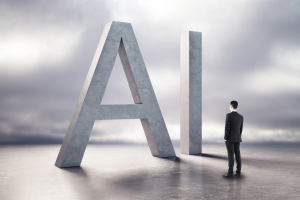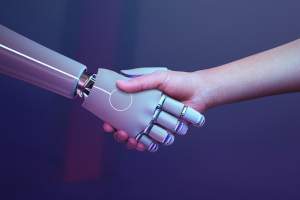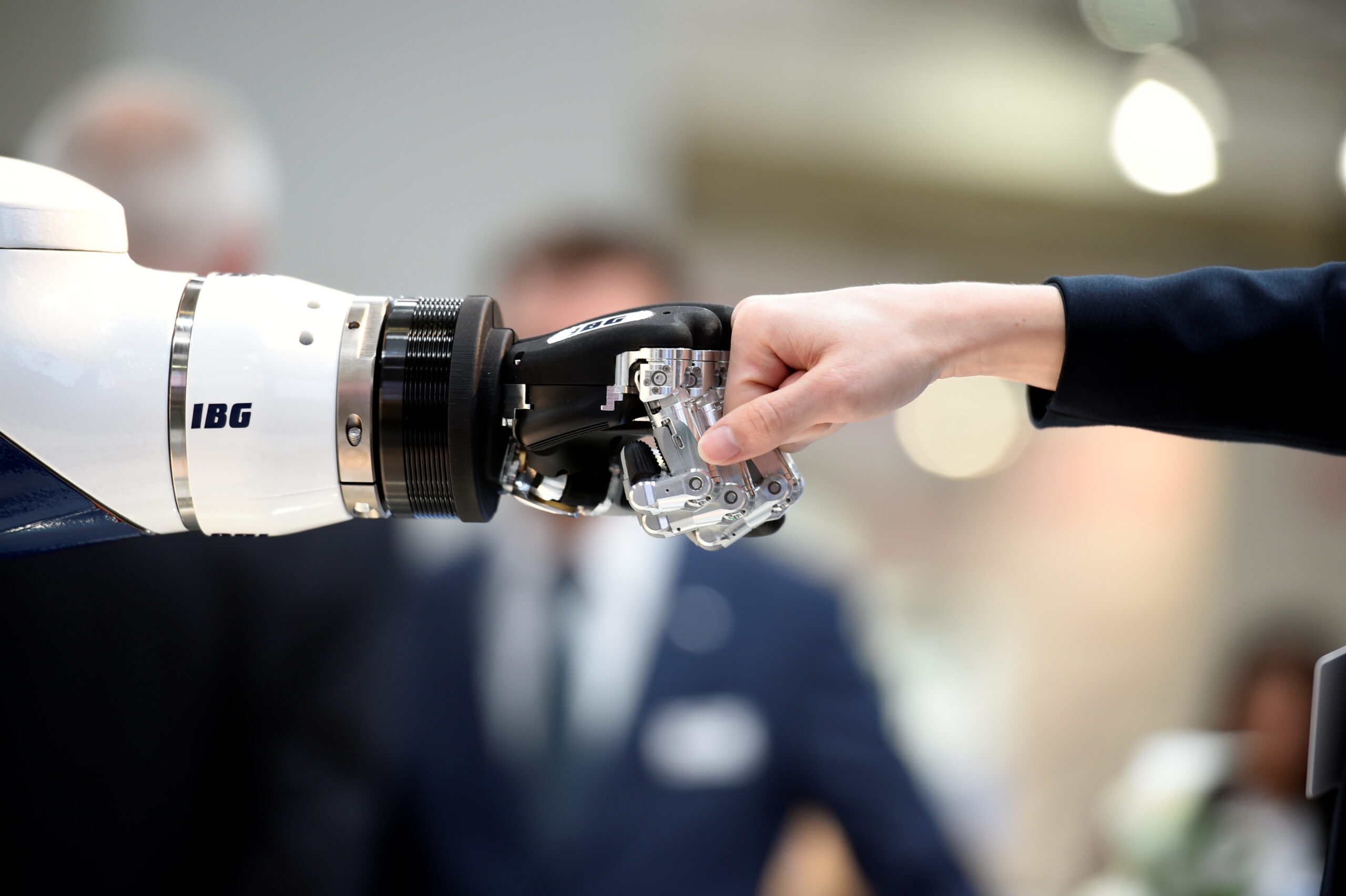
Authors: Darrell M. West, John R. Allen; Dmytro Spilka and
Evelyn Miller
Compiled by D.A. Oluwole, PhD
Most people are not very familiar with the concept of artificial intelligence (AI). As an illustration, when 1,500 senior business leaders in the United States in 2017 were asked about AI, only 17 percent said they were familiar with it.1 A number of them were not sure what it was or how it would affect their particular companies. They understood there was considerable potential for altering business processes, but were not clear how AI could be deployed within their own organizations.
Despite its widespread lack of familiarity, AI is a technology that is transforming every walk of life. It is a wide-ranging tool that enables people to rethink how we integrate information, analyze data, and use the resulting insights to improve decisionmaking. Our hope through this comprehensive overview is to explain AI to an audience of policymakers, opinion leaders, and interested observers, and demonstrate how AI already is altering the world and raising important questions for society, the economy, and governance.
In this paper, we discuss novel applications in finance, national security, health care, criminal justice, transportation, and smart cities, and address issues such as data access problems, algorithmic bias, AI ethics and transparency, and legal liability for AI decisions. We contrast the regulatory approaches of the U.S. and European Union, and close by making a number of recommendations for getting the most out of AI while still protecting important human values.2
In order to maximize AI benefits, we recommend nine steps for going forward:
- Encourage greater data access for researchers without compromising users’ personal privacy,
- invest more government funding in unclassified AI research,
- promote new models of digital education and AI workforce development so employees have the skills needed in the 21st-century economy,
- create a federal AI advisory committee to make policy recommendations,
- engage with state and local officials so they enact effective policies,
- regulate broad AI principles rather than specific algorithms,
- take bias complaints seriously so AI does not replicate historic injustice, unfairness, or discrimination in data or algorithms,
- maintain mechanisms for human oversight and control, and
- penalize malicious AI behavior and promote cybersecurity.
AI for Research
Artificial Intelligence (AI) is playing an increasing role in the research process. AI-based algorithms are being used to improve the efficiency of research and to provide new perspectives on explored topics. They are valuable not only in drawing connections between different pieces of information but also in proposing and testing new hypotheses.
AI Research Use Cases
A major advancement in artificial intelligence research recently came with a machine learning algorithm capable of inventing radical new proteins that can fight disease. Also, AI researchers are now developing algorithms that can search for scientific research papers and extract information from them to automatically correct scientific papers. Let’s take a look at some more uses cases of AI in research.
#1: Automated Data
Artificial intelligence is also used to optimize resources in research laboratories, automate the acquisition of data and facilitate the synthesis and analysis of complex datasets. For example, AI has recently been used to help manage the activities in large-scale, long-term studies by providing real-time guidance. An AI system may be able to monitor the health of each participant in a study and alert a scientist if a participant’s status changes.
#2: Optimize Equipment
AI is also being used to optimize laboratory techniques and equipment. AI-driven robots can automatically perform several tasks that were previously only carried out by humans, such as organizing and storing scientific equipment, preparing samples for analysis, and carrying out routine diagnostic tests. In addition, automated systems are also able to carry out tasks that are too dangerous or difficult for scientists or technicians to complete themselves. AI and robotics are also being used in the design of experiments—helping researchers determine which parameters should be changed, how the experiment should be designed, and what measurements should be made.
#3: Healthcare
Many believe AI will soon be used to identify new drugs and drug combinations, diagnose diseases from medical images, and assist in surgeries. AI was used to predict an enzyme better than any other prediction before. A technique called deep learning was used. The system was able to predict the three-dimensional structure of an enzyme. The most important thing is that the 3D structure was more complex than those the algorithm was previously trained to deal with. Artificial intelligence has also been successfully used in cancer research to create better ways to detect, diagnose, and treat cancer patients.
Researchers reported that they used machine vision to analyze human behavior and physical characteristics in videos of people with autism and Asperger’s Syndrome. They used AI algorithms based on deep learning with a dataset of 1,200 videos featuring 12-megapixel cameras, just like the ones on iPhone 13, and individuals making facial expressions or engaged in social interactions, such as smiling or nodding. The analysis revealed ten distinct facial states of autism, while deep neural networks also accurately projected the severity of symptoms.
#4: Computer Science
Researchers use AI-based algorithms to search databases of molecules and find effective molecules with desired properties. Such an algorithm may be able to search databases of millions of molecules in a fraction of the time it would take an expert scientist.
Computer scientists also created a system that can be used to generate new educational games based on existing video games. The researchers used AI to develop new algorithms for recombining existing game elements into new types of games. They used machine learning to create the system, which uses a personalized learning algorithm to select elements from a large amount of video game content and then recombines them in an unpredictable way. The researchers suggest that this technique could be useful for exploring different genres of video games or creating new genres based on already existing ones.
The Future of Research
It has been asserted that AI affects the nature of humans, their intelligence, and the decision-making process. With the advent of AI, there is concern over how its creations could affect human beings, including encouraging biases in human thought processes. A common concern is that machines would become smarter than humans and thus gain control. Regardless, AI is proving a powerful tool for connecting information and drawing new hypotheses.
Benefits of AI for employees
Artificial intelligence (AI) is quickly changing the corporate landscape, and businesses that don’t use it risk falling behind. AI has many advantages, but some companies hesitate to take the decision of utilizing AI in daily operations due to a lack of knowledge. Here, we will talk about the benefits of training employees on artificial intelligence, since we believe that if a company, from managers to employees, knows how AI can benefit them, they will be more likely to solve their problems with AI.
Benefits of AI for Businesses

AI is used in several industry fields and businesses, including manufacturing, financial services, consumer goods, retail, marketing, medical diagnosis, and so on. Among the advantages of AI are:
Increased productivity and efficiency
AI can automate routine tasks to speed up operations. Employees now have more time to work on challenging or creative projects. Businesses can become more adaptable and better able to quickly address customer needs with the use of technology. Thanks to automation, this can result in both higher revenue and lower costs.
Understanding customer better
AI can assist organizations in better understanding their consumers’ requirements and preferences, resulting in better customer service. It can also help businesses make personalized suggestions based on real-time data analysis from multiple sources, such as social media or online shopping behavior.
Saving money
Automation saves money by automating processes that were used to need human help or intervention. For example, compliance checks for certain contracts and other legal documents that may need to be reviewed by multiple people within an organization can now be done automatically. Over time, this helps cut costs and eliminate redundant processes.
Better insights and decisions
Through the application of artificial intelligence, computers are able to make conclusions based on data analysis as opposed to only human intuition. Businesses can benefit from this by learning crucial information they otherwise wouldn’t be able to about their clients, staff, and daily operations that can help them make better decisions.
Why Businesses Should Adopt AI

AI is contributing a lot to many aspects of life, and companies need to start using it as soon as they can to stay competitive. Here are some advantages that businesses can gain from implementing AI in their daily operations.
It costs less than hiring new workers
Due to the present labor shortage and high turnover rates, businesses are seeking ways to minimize expenses and save money. One way to do this is to hire fewer people by automating some tasks with software or by outsourcing jobs that don’t require high-level skills. AI can help businesses increase productivity while lowering labor costs, even though hiring new employees can be expensive.
It makes organizations more productive
As we’ve already mentioned, AI can help streamline activities that would normally be very labor-intensive for people. This means that employees will have more time to focus on strategic priorities instead of routine tasks. This will help them work more efficiently for the company.
It helps businesses stay competitive
AI is being used more and more by businesses in all fields because they know it will help them stay competitive in today’s fast-paced world. By using AI to automate some tasks, businesses can save time and money while also improving the overall customer experience.
It makes more money
When businesses use AI, they can better find out what their customers want and give them what they want. Giving each customer a more individualized experience, helps them make more money.
Importance of Providing AI Training to Employees

Artificial intelligence is expanding swiftly, enabling businesses to increase productivity by streamlining and automating a variety of processes. But AI is not a magic bullet that can solve all business problems right away. AI will only be effective if the company and its people are skilled at using it.
Employers can hire data scientists and AI experts. Or instead, they can teach their staff about AI. They need to train their employees on AI so they can use it in their jobs. There are a number of ways for businesses to train their employees in AI: workshops, online courses, and corporate AI training programs.
Since each company has different goals and problems, they should choose the right training sessions that fit the needs of the company and its employees. They can cover everything from AI basics to more advanced applications. Employees must have a thorough understanding of AI, including both its potential benefits and drawbacks, for businesses to successfully integrate and deploy it within the organization.
Companies can help their employees learn more about AI by letting them go to industry-specific events and giving them access to online training materials. Businesses need to give their employees real-world experience using AI tools like machine learning algorithms.
Now, let’s talk about these programs:
Internal training programs
Companies can create their own internal training programs to give employees the AI knowledge and skills they need. These programs can be created by training experts who work for the company or by AI-focused training companies that work for the company outside of the company. These programs can have both online and hands-on components and are typically offered as part of a larger business course that covers topics like data analytics and machine learning. As these courses become more popular, some businesses may decide to work with an outside company to create their internal program.
Training from outside the company
Businesses can also work with outside groups, like universities or training providers, to give their employees AI training. Most of the time, these courses have both online and hands-on components. They can be a part of a bigger business course or stand-alone.
Online resources
Employees may acquire knowledge about AI on their own by using online tools such as courses, tutorials, and webinars. These materials are useful for employees who need a short overview of a topic or a refresher, but they aren’t ideal for studying more in-depth knowledge.
On-the-job learning
Providing employees the opportunity to work on AI-related projects and tasks can also help them get a better grasp of AI and its applications. Workers should be encouraged to inquire about the projects they are working on and how they connect to artificial intelligence. They may be required to communicate their findings to the organization or team as well.
Conclusion

In conclusion, businesses should think about giving their employees some AI training, even if it’s just the basics. Businesses can’t ignore the many advantages of AI. AI training makes employees more skilled, productive, and competitive. Training employees on artificial intelligence can also help them understand the technology and its potential, which could help them come up with new ideas. Employees can also learn about AI through online courses, workshops, and internal training. Businesses can succeed in the rapidly changing digital landscape by training their employees in AI.
